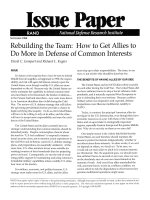LLF9+ +exactly+what+activities+to+do+everyday
Bạn đang xem bản rút gọn của tài liệu. Xem và tải ngay bản đầy đủ của tài liệu tại đây (1.88 MB, 41 trang )
EXACTLY WHAT ACTIVITIES TO DO EVERY DAY
LANGUAGE LEARNING FOUNDATIONS
Iwillteachyoualanguage.com
In this module you will learn:
The 3 pillars of effective daily study
How to decide what to do every day
Sample schedule
But first…
There are many ways to learn a language.
Telling you what to do every day is
problematic.
You risk neglecting other areas that might be
important for you as an individual.
But it’s also a risk that without a clear path
to follow, you end up doing nothing.
I believe action is better than inaction,
because you learn from your experiences.
So on the understanding that you need to
take this information and personalise it to
your needs…
Here’s what to do every day to learn a
foreign language quickly.
1. The 3 pillars of effective daily
study
the
o
t
d
e
s
Get u uage
lang
INPUT
Figure out h
ow it
all works
OUTPUT
Learn it
REVISION
Let’s look at how these pillars
translate into actual activities
INPUT
OUTPUT
REVISION
Textbook
dialogues
(see Mod.3)
Regular speaking
practice (Mod.4)
Vocabulary review
with flashcards
(Mod.5) or other
method
Immersion
(see Mod.7)
Focused, in-depth
practice activities
(Mod.6)
2. How to decide what to do
every day
When thinking about how to
study everyday, first take a
step back.
How are you going to ensure you
cover all the pillars we’ve just
looked at?
The trick is to start with the
whole week view and work
backwards from there.
Decide what you’re most likely
not to do, and schedule that first.
And for most of us, that means…
INPUT
OUTPUT
Regular speaking
practice
REVISION
Speaking should be the
cornerstone of your language
learning week, both for progress
and motivation.
However, because they rely on
other people, they are the part of
your routine that you’re most likely
not to do.
In other words, when planning
your week, start with speaking
sessions and fill in the gaps from
there!
3. Sample schedule
Let’s look at exactly how to plan
your week and what to do.
M
T
Textbook
dialogue
(listen)
Textbook
dialogue
(listen, read,
study)
Speaking
session
(work on
prepared
speech)
REVISE
FLASHCARDS
REVISE
FLASHCARDS
REVISE
FLASHCARDS
W
T
F
S
Textbook
dialogue
(listen)
Speaking
session
(work on
prepared
speech)
Day off
Textbook
dialogue
(listen for
review)
Practise
prepared
speech
REVISE
FLASHCARDS
REVISE
FLASHCARDS
REVISE
FLASHCARDS
Practise
prepared
speech
REVISE
FLASHCARDS
TV, music, podcasts, books
S
M
T
Textbook
dialogue
(listen for
review)
Day off
REVISE
FLASHCARDS
REVISE
FLASHCARDS
W
Speaking
session
(repeated
conversations)
REVISE
FLASHCARDS
T
F
Textbook
Speaking
dialogue
session
(listen for
(repeated
review)
conversations)
Diary entries
REVISE
FLASHCARDS
REVISE
FLASHCARDS
TV, music, podcasts, books
S
S
Textbook
Textbook
dialogue
dialogue
(listen, read) (read & study)
Diary entries
REVISE
FLASHCARDS
REVISE
FLASHCARDS
It doesn’t matter how you do it,
but...
1
Schedule your speaking sessions first
2
Spread your input and output during the week
3
Revise, revise, revise









